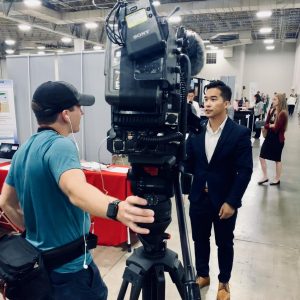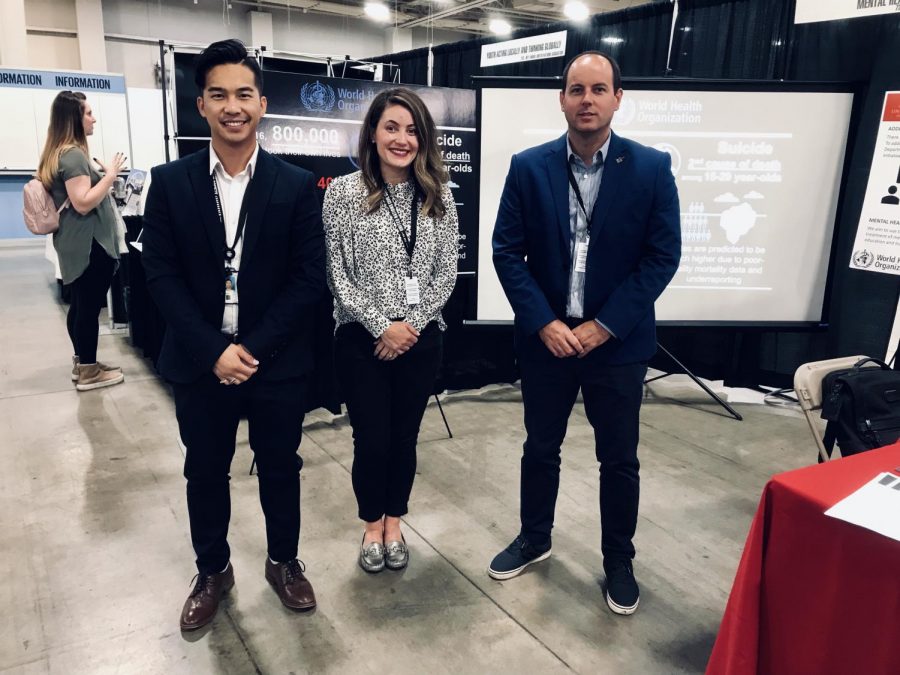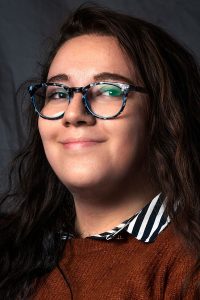University of Utah Physician Set to Launch App Tackling Suicide and Global Mental Health
Alexander Au (left) stands with his mentors, mentors Dr. Sarah Mullowney (center) and Dr. Damian Borbolla (right). (Courtesy Alexander Au)
September 12, 2019
A report from the Center of Disease Control in 2017 found that the second leading cause of death in American adolescents (ages 15-19) was suicide. According to another study put out by the CDC, Utah has had a 46.5% increase in suicides since 1999, which makes Utah the fifth most suicidal state in the nation.
Even more alarming is the rate of teen suicide in Utah. In 2018, within one high school, seven students had died by suicide. In 2016, it was declared that the leading cause of death among children between the ages of 11-17 was suicide. These numbers pale in comparison to international statistics regarding mental health and suicide. This fact, however, brings to attention an even more alarming statistic: the majority of international suicides are in fact never documented as most are ruled as “accidental deaths,” which may be due, in part, to cultural stigmas and attitudes regarding mental health.
Dr. Alexander Au, a suicidologist and mental health advocate, noticed and experienced this problem firsthand. While a student at the University of Utah, Au developed an app, MoodPal, that promoted emotional intelligence and self-awareness.
Au is now working on a new project — an app with the Global Health Initiative to facilitate education and research into the complex issues of global mental health and suicide.

“There are three aims to the initiative,” Au said in an email to The Daily Utah Chronicle. “The first is to provide an ability to collect data on mental illness, suicide and potetional stressors or risk factors for different regions of the world.
“The second aim is to provide mental health services to assist healthcare providers diagnose and manage patients with mental illness using screening tools.
“The third aim is to create a suicide risk assessment tool using a machine-learning algorithm to alert providers a patient’s risk and if further interventions are recommended.”
Au used his background in biomedical informatics and medicine at the U to develop this project. The app connects mental health specialists and clinics, facilitating innovative solutions for suicidal patients with less access to necessary resources, especially in rural areas. “The goal is not only to understand the factors leading to suicide, but [to] create a solution that can addresses mental health in those communities,” he said.
Au started planning the idea of this app more than two years ago. Now, Au is planning to launch a beta-version of his app in clinics by the end of the year. “I want to make this app easily integrated and become an effortless part of a clinic’s protocol,” he said. Au also wants to gain funding, increase awareness of his project and bolster support from colleagues and community leaders.
Au is already building excitement for his groundbreaking work. In August, he spoke about the Global Mental Health Initiative at the U.N. Civil Society Conference in Salt Lake City. Au has been invited by the U.N. to speak in New York on Oct. 10, World Mental Health day, about “suicide, mental health and the app I am building for the Global Mental Health Initiative.” He will be the first person from the U to speak at this event.
“The time and effort being put into this comes from my hope to do something big, something different, something that will change the world,” he said. “I hope to inspire others to understand that no idea is too big.”
An earlier version of this article misattributed quotes from Dr. Au. His statements were about his new project, the Global Mental Health Initiative, not his previous project, MoodPal. This version of the article includes quotes from a later interview with Dr. Au and discusses his new project. We regret the errors.








